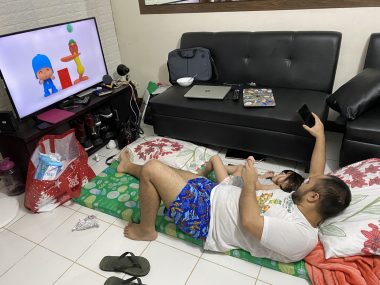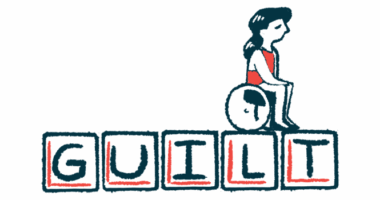Finding a Better Way to Support People With Disabilities

I recently took a photo of my husband, Jared, looking after our daughter, Cittie. They were both snuggled up on a foam mattress laid out in front of the television. It was a sweet photo, but their perfect smiles and adorable cuddles obscured a dark reality: At the time, Jared couldn’t physically stand up due to an iliopsoas bleed, a common but debilitating occurrence with hemophilia.
Jared likes looking after our daughter while he’s debilitated. It’s the best he can do, knowing that I must temporarily take on his other responsibilities until he recovers. He feels sad because he can’t help me as much as he wants to.

Alliah’s husband, Jared, looks after their daughter, Cittie, while he nurses an iliopsoas bleed. (Photo by Alliah Czarielle)
For a second, it crossed my mind to post the sweet photo in a popular parenting group online. A few months ago, I shared my husband’s parenting story, and many seemed to like it. It was even featured on a parenting website.
Then I remembered what happened after I posted it. People flocked to the comment sections to leave their thoughts, including comments that our story is “inspiring.”
I realized I had inadvertently prompted something that bothers me, a phenomenon we often refer to as “inspiration porn.” As the spouse and advocate of a person with disability (PWD), I love sharing with others the fact that I appreciate my husband. But I also can’t help but think that I had given people the wrong idea.
The reason I have an issue with this is because I believe that people with disabilities don’t exist simply to inspire. Oftentimes, they are living their lives and trying to survive in a world that isn’t built in their favor. If they’re fortunate, they’ll manage to find meaning and purpose as they go.
PWDs experience far more challenges than most. Jared can attest to the fact that it is especially difficult for a PWD to measure up to the world’s standards, let alone be known as “great” or “good” at what they do. And without a lot of love and support, they can be made to feel like their wings are clipped.
Without financial support, many people with disabilities around the world have no access to medication that is essential for their functioning. People with hemophilia, like Jared, need to infuse factor products regularly to prevent them from being injured and ending up with bad joints.
Without emotional support, people with disabilities are forced to endure less than ideal living arrangements that may keep them from spreading their wings and achieving their full potential. Worse, they may become stuck in situations that make them prone to discrimination or abuse.
People with disabilities need support from those who can give it. And small gestures, while thoughtful, don’t count as support. It’s not enough that we do things for the disabled people in our lives. It’s more important that we let them do things for themselves and others, and that we help them help us. That way, they can also do more and fulfill the purpose they seek for their lives.
***
Note: Hemophilia News Today is strictly a news and information website about the disease. It does not provide medical advice, diagnosis, or treatment. This content is not intended to be a substitute for professional medical advice, diagnosis, or treatment. Always seek the advice of your physician or another qualified health provider with any questions you may have regarding a medical condition. Never disregard professional medical advice or delay in seeking it because of something you have read on this website. The opinions expressed in this column are not those of Hemophilia News Today or its parent company, Bionews Services, and are intended to spark discussion about issues pertaining to hemophilia.







Leave a comment
Fill in the required fields to post. Your email address will not be published.